In this week’s review of Court Judgments, we look at SC’s directions that DNA tests have the potential to violate privacy rights and cannot be ordered routinely; Section 112 Evidence Act safeguards children, Delhi HC’s observation that questions of faith have no bearing on an individual’s freedom to choose a life partner and are essence of personal liberty, Karnataka HC ruling that divulging pre-existing illness is a duty of the insured, and the repudiation of the claim cannot be found fault with among others.
Supreme Court: DNA tests have the potential to violate privacy rights and cannot be ordered routinely; Section 112 Evidence Act safeguards children.
A two-judge bench of the Supreme Court, consisting of Justice Aniruddha Bose and Justice Vikram Nath, held that DNA tests can violate the right to privacy and merely because something is permissible under the law cannot be directed as a matter of course, thereby setting aside the Judgement of High Court of Judicature at Hyderabad for the State of Telangana and the State of Andhra Pradesh in Inayath Ali & Anr vs. State of Telangana & Anr.
The apex court was hearing an appeal against the revisional judgement of the High Court of Judicature at Hyderabad for the State of Telangana and the State of Andhra Pradesh, wherein, the High Court upheld the judgement of the trial court directing the appellants to give blood samples for obtaining an expert opinion on DNA fingerprint test. The High Court held that DNA fingerprint test was permitted under Sections 53, 53A and 54 of the Criminal Procedure Code,1973 and it did not amount to testimonial compulsion.
The apex court relied on Ashok Kumar vs. Raj Gupta and Ors, wherein it was held that
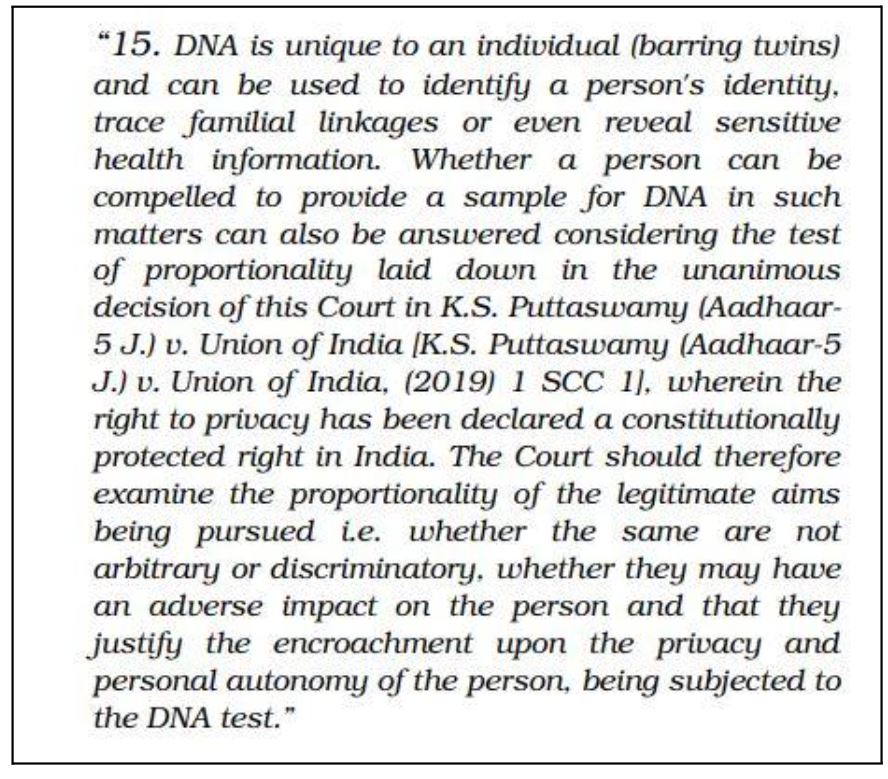
The apex court looked at two factors which have been ignored by the Trial Court as also the Revisional Court. The first is the blood sampling of the children was directed, who were neither parties to the proceeding nor were their status required to be examined in the complaint of the respondent. The apex court held that Trial Court as also the Revisional Court had completely ignored the said factor and proceeded as if the children were material objects who could be sent for forensic analysis, ignoring the Section 112 of The Indian Evidence Act, 1872.
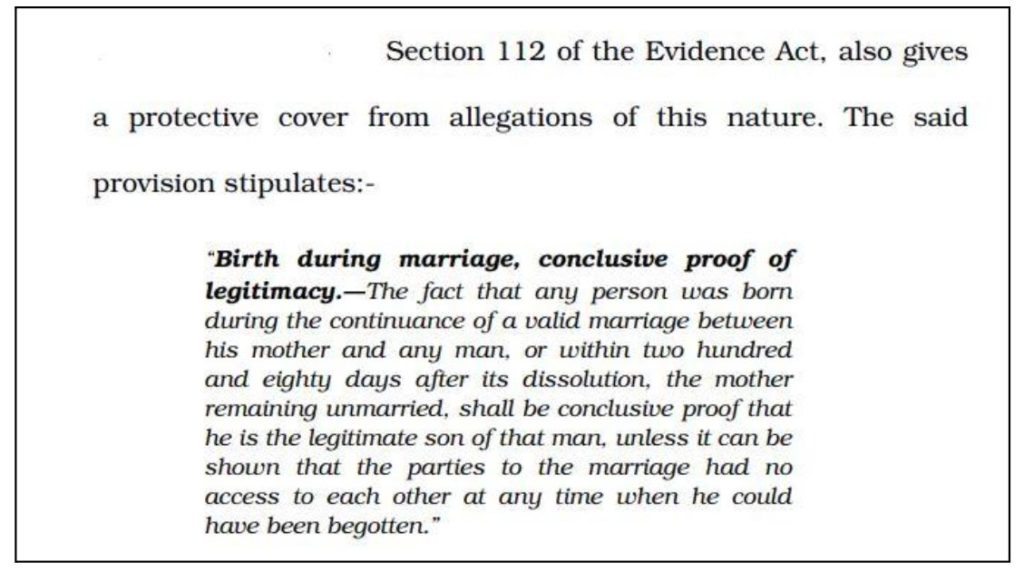
The other factor which both courts overlooked is the paternity of the children was not in question of the subject matter. Accordingly, the apex court set aside the judgement and allowed the appeal.
Delhi HC: Questions of faith have no bearing on an individual’s freedom to choose a life partner and are essence of personal liberty
In Naina Rana vs. State (Government of NCT of Delhi), the single bench headed by Justice Anoop Kumar Mendiratta held that the fundamental component of Article 21 of the Indian Constitution is the freedom of choice in marriage when done in conformity with the law. Even questions of faith are irrelevant to a person’s ability to select a life partner and are fundamental to personal liberty.
The Delhi High Court was hearing bail petitions filed by the family members of the wife, whose marriage was against the will of the family. The complaint was given by the husband, where in the complainant alleged that his wife’s family members abducted him and his wife, brutally injured them and amputated the private part of the husband.
The counsel for petitioners argued that there were no specific allegations against them and one among the petitioners cited old age and medical conditions to be considered for the granting of bail. The counsel for the complainant vehemently opposed the bail applications. Upon hearing the arguments from both sides, the High Court granted bail to one petitioner and found no grounds for bail for the other two petitioners. Further, the court held that
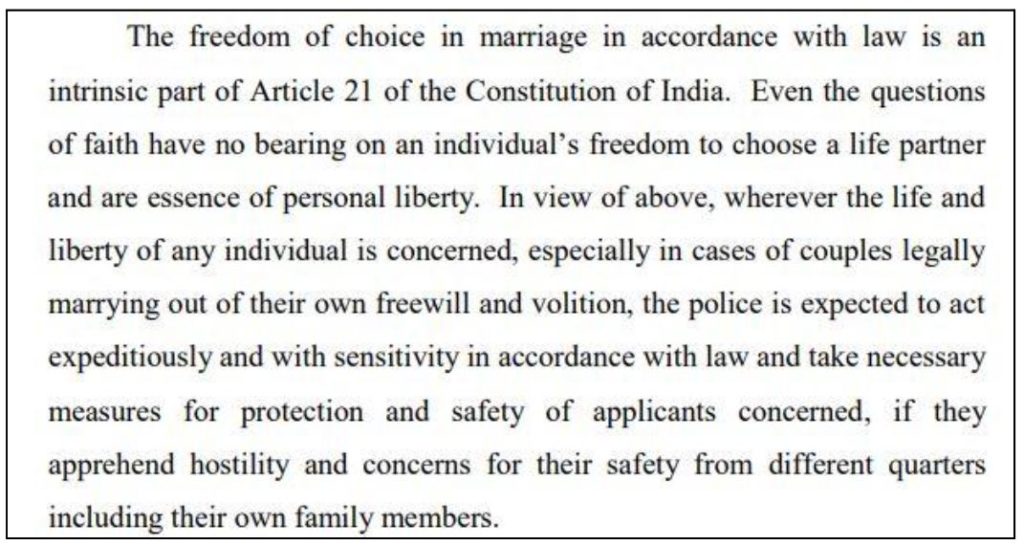
It further directed the police to investigate the conduct of the police officials involved, and initiate necessary action against them, and noted that any further lapse on behalf of the police shall not be tolerated. Accordingly, the bail petition of one petitioner is granted, while for the rest, the bail petition is dismissed.
Karnataka HC: Divulging pre-existing illness is a duty of the insured, and the repudiation of the claim cannot be found fault with.
A single judge bench headed by Justice M Naga Prasanna held that it is the duty of the insured to disclose pre-existing illness and any repudiation of the claim for failing to divulge pre-existing illness cannot be found fault with, during the hearing of Mrs. Jaya Elizabeth Mathew & Anr vs. Insurance Ombudsman for the State of Karnataka & Anr.
The High Court was hearing a petition filed to quash the repudiation issued by the insurance company and direct it to release the insurance claim amount of the petitioners. The High Court looked at the question of whether repudiation of an insurance claim is valid in the eyes of law.
The High Court, upon going through the facts and history of the case, held that the contention of the petitioner claiming it not to be pre-existing illness is unacceptable. The court relied on Satwant Kaur Sandhu vs. New India Assurance Company Ltd, where it held that
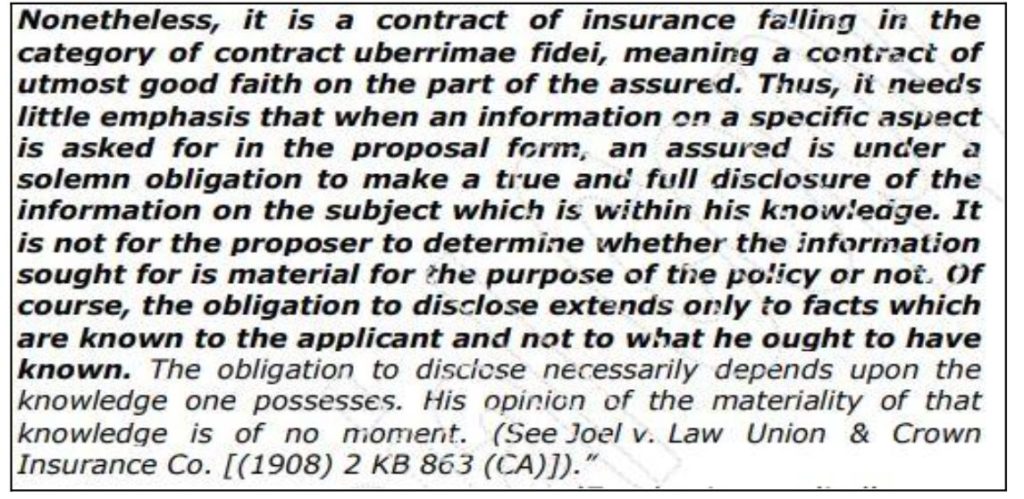
It also looked at Reliance Life insurance company and another vs. Rekhaben Nareshbhai Rathod, where it was held that the insured is under solemn obligation to make full disclosure of material facts which may be relevant to the insurer to take into account while deciding whether the proposal should be accepted or not.
The court further contended that the Mediclaim policy is a contract of utmost good faith and when specific information is asked for by the insurer, it is the obligation of the assured to divulge any such information. In the above case, the disease which the petitioner was suffering from was specifically mentioned in the proposal form. Further, the court held that
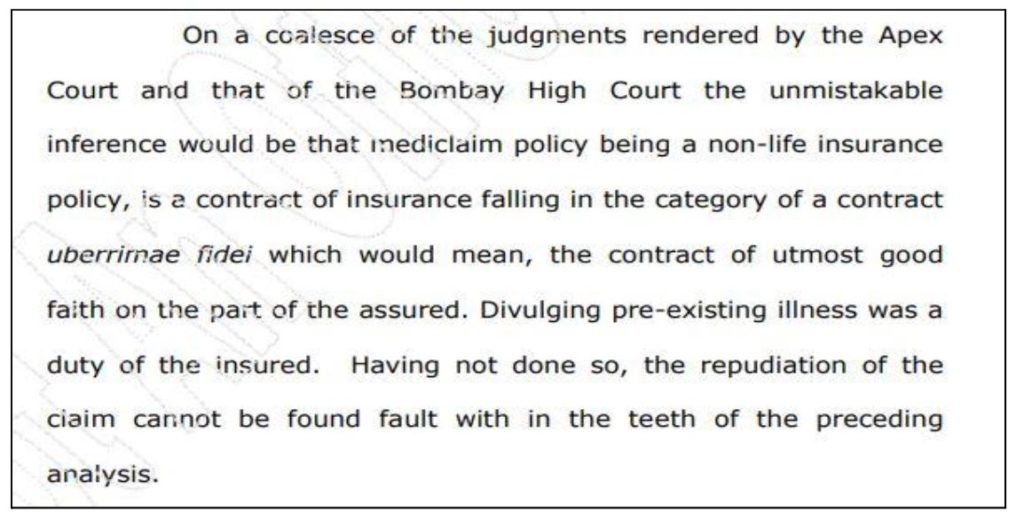
Accordingly, the petition was dismissed.
HC of Jammu & Kashmir and Ladakh: Appellate authority is the appropriate forum and not courts to determine if a case warrants action under Section 8 (4) of the Prevention of Money Laundering Act (PMLA).
In Syed Akeel Shah vs. Directorate of Enforcement, the High Court of Jammu and Kashmir and Ladakh held that appellate authority is best suited to determine whether a case warrants action under section 8(4) of PMLA, 2002 based on the merits of the case, and not courts through its writ jurisdiction.
The two-judge bench headed by Chief Justice Ali Mohammad Magrey and Justice Sanjay Dhar was hearing an appeal petition filed against the judgment of the writ court to not involve in the proceedings. The case relates to an investigation under provisions of PMLA against Rahul Grover and others based on the allegations of purchasing land with illegal funds raised through indulgence in the issuance and renewal of arms against the provisions of the Arms act.
The Assistant Director, Directorate of Enforcement, exercising powers under section 8(4) of the PMLA, directed the appellants to vacate the attached property, which was challenged before the writ court. This petition is an appeal against the dismissal earlier by the writ court. The appellants relied on Vijay Mandal Choudhary & Ors. vs. Union of India & Ors, where it is held that taking possession of the property before a formal order of confiscation is passed, merely based on confirmation of provisional attachment order, should be an exception and not a rule.
The High court found no dispute with the legal position held by the Supreme Court in Vijay Mandal Choudhary’s case. However, as per rule 5(2) of the Prevention of Money Laundering (Taking Possession of Attached or Frozen Properties Confirmed by the Adjudicating Authority), Rules, 2013, once the attachment of immovable property has been confirmed by the Adjudicating Authority and it is found to be in possession of the owner, the authorized officer has to issue a notice of the eviction of ten days so as to prevent the person from enjoying such property and if such person does not vacate the property within the stipulated time, he has to be evicted by taking possession thereof. The aggrieved person has the right to appeal within 45 days from the date of receiving the order under section 26 of PMLA.
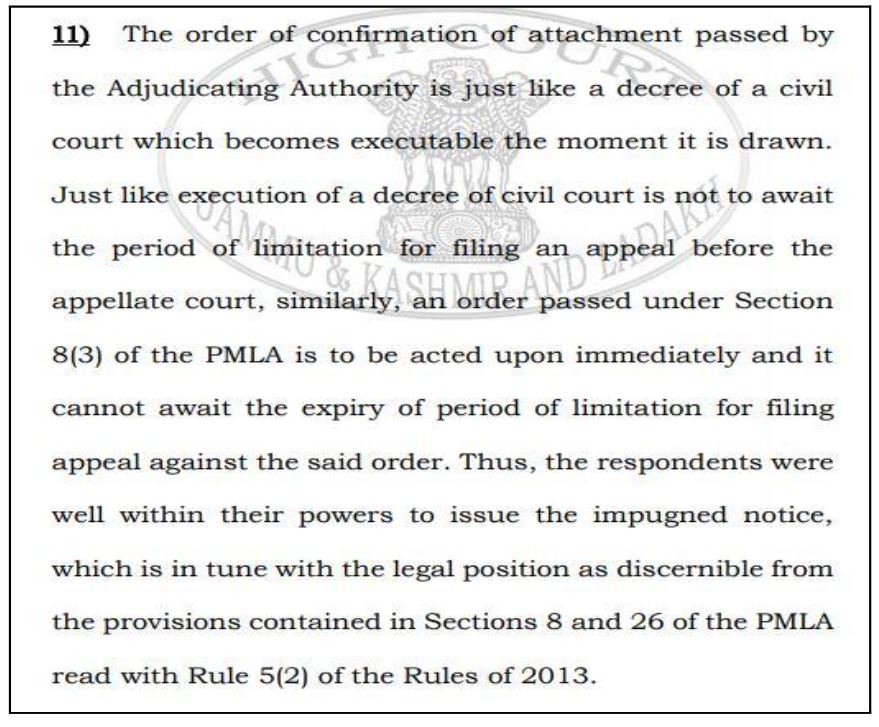
Further, the court held that appellants cannot bypass the remedy of appeal by invoking the writ jurisdiction of the High Court, and whether a case is of exceptional nature can only be determined by the appellate authority considering the merits of the case, and not writ courts. Accordingly, the appeals are dismissed.
Kerala HC: POCSO Act Prevails Over the SC/ST Act; When charged under both statutes, accused may directly approach High Court under Section 439 CrPC.
In Renoj R.S. vs. State of Kerala & Anr, the Kerala High Court held that the legislature intended to give supremacy to the POCSO Act, even over the SC/ST Act, in the event of any inconsistency, and the accused is entitled to approach High Court directly under Section 439 of The Code of Criminal Procedure, 1973.
The High Court was hearing the bail application by the petitioner against whom offences under Protection of Children from Sexual Offences Act, 2012, and Scheduled Tribes (Prevention of Atrocities) Act, 1989 are alleged. The bail application was placed before the registry which objected considering the allegations under SC/ST Act, and an appeal only is maintainable under section 14A of the act as was decided in Basheer vs. Rajani case.
The High Court highlighted the conflict in the application of provisions of the two statutes, as below.
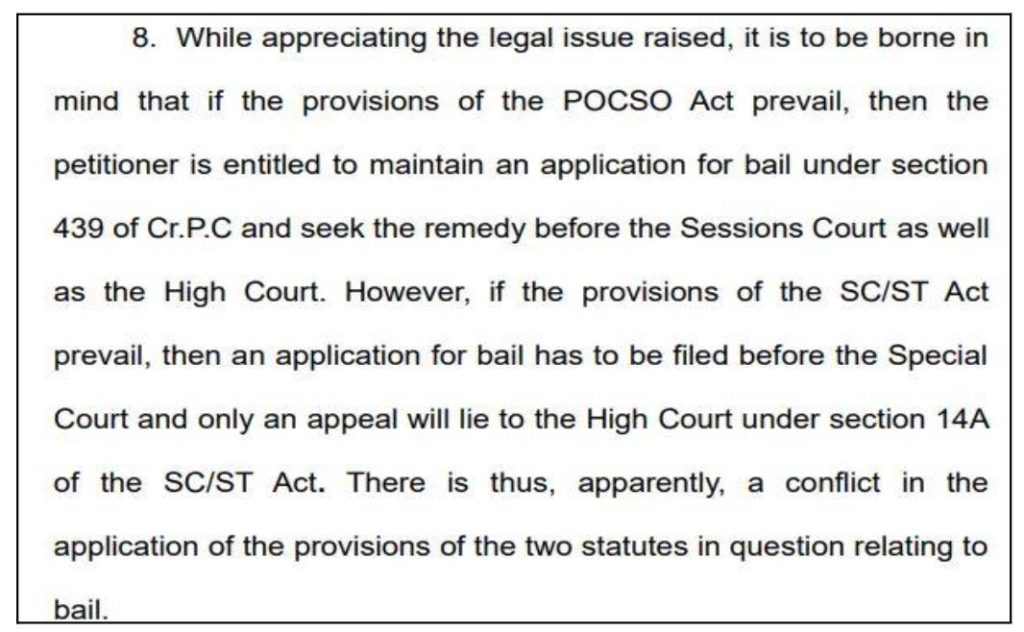
Thus, the jurisdiction of the High Court under the SC/ST Act relating to bail is appellate, while under the POCSO Act, when read with CrPC, the jurisdiction is concurrent and original. The court highlighted that the SC/ST act was amended twice in 2015 and 2018, while the POSCO act was not interfered with by the Parliament, giving evidence of the legislature intending to give supremacy to the POSCO act even over the SC/ST act in case of inconsistency.
When a conflict between two statutes arises, the first task is identifying the special statute. If both are special statutes, the latter of the two statutes will prevail. The principles relating to the resolution of conflicting statutes are clearly delineated in several decisions, including Solidaire India Ltd. vs. Fairgrowth Financial Services Ltd. and Others, as below.

Based on this judgement, the High Court looked at the provisions of section 42A of the POCSO Act, which indicate that it prevails over all other laws in the event of any inconsistency. Accordingly, the High Court held that the accused is permitted to apply the process for bail outlined in the POCSO Act whenever both a POCSO Act offence and a violation of the SC/ST Act are charged. Since the provisions of the Code of Criminal Procedure are rendered applicable by section 31 of the POCSO Act, the petitioner is fully justified in approaching this Court under section 439 of the Code of Criminal Procedure, 1973.
Kerala HC: State Information Commission is not empowered under Section 18 of the Right to Information Act to direct PIO to furnish the sought information
A Division Bench of the Kerala High Court consisting of Justice Anil K. Narendran and Justice P. G. Ajith Kumar, while hearing State Information Commission vs. C. V. Rajendran and Ors observed that section 18 of the Right to Information Act, 2005 does not empower the state commission to direct the Public Information Officer (PIO) to furnish the information sought.
The court was hearing a review petition filed by the State Information Commission (SIC) against the judgement of 2014, wherein it was held that when an application for information under section 6 of the Act is rejected, either expressly or otherwise, the remedy available to the applicant is to file an appeal as provided under section 19 of the Act and that a further complaint under section 18 is not maintainable.
The Standing Counsel for the State Information Commission argued that
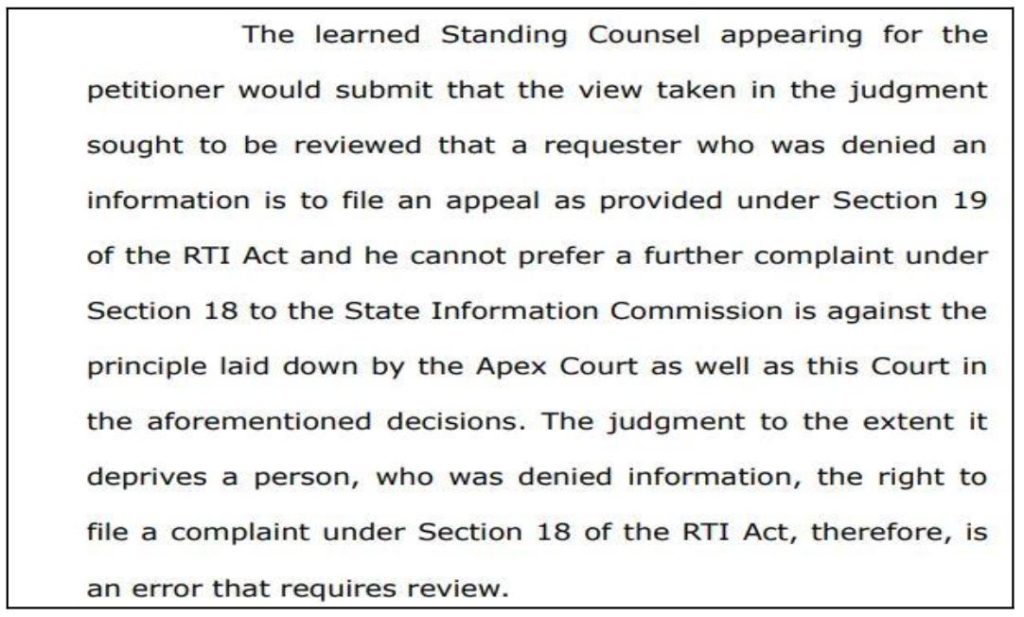
Upon hearing the arguments, the court held that if a requester has applied for information under Section 6 of the Act and then not having received any reply thereto, it must be deemed that he has been refused the information. The said situation is covered by Section 7 of the Act. The recourse open for such a person to get the information is provided under Section 19 of the Act, and the power to impose a penalty is laid under section 20 of the act.
The High Court relied upon the judgements in B.N. Mohanadasan vs. State Information Commission and others, and Chief Information Commissioner and another vs. State of Manipur and another wherein it was held that Sections 18 and 19 of the RTI Act serve two different purposes and lay down two different procedures and they provide two different remedies, and a perusal of Section 20 of the Act, wherein it is provided for the imposition of a penalty on a complaint or in an appeal, indicates that irrespective of invoking the appeal provision under Section 19, a party can approach and invoke jurisdiction of the State Commission through a complaint by bringing to its notice that there was an illegal denial of information or withholding of information.
Accordingly, the Kerala High Court held that the procedure contemplated under Sections 18 and 19 of the RTI Act is substantially different. The nature of the power under Section 18 is supervisory in character whereas the procedure under Section 19 is an appellate procedure. The aggrieved cannot resort to Section 18 of the Act to get access to the information since the provisions under Section 18 do not invest such a power in the Commission. The review petition was dismissed accordingly.


